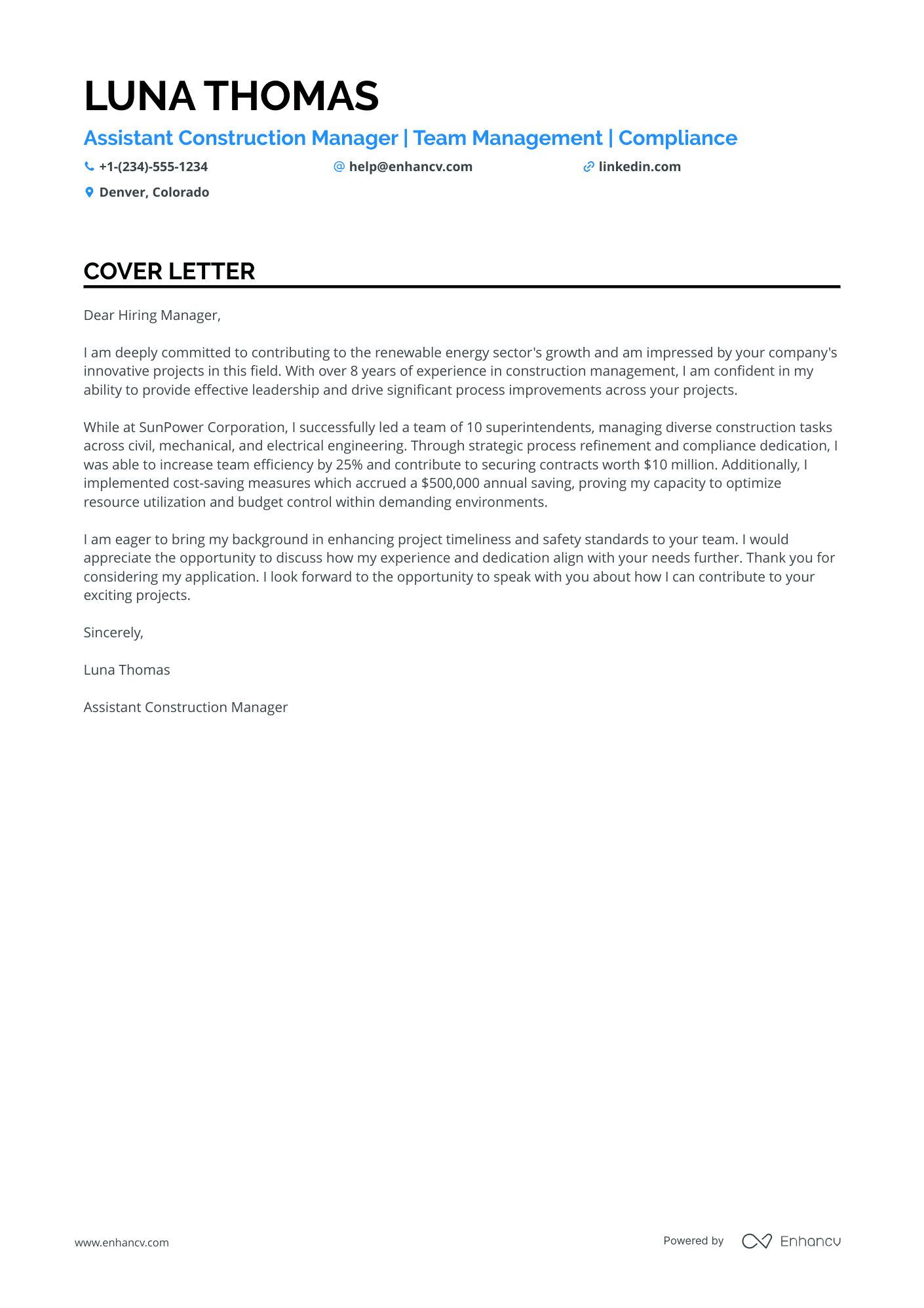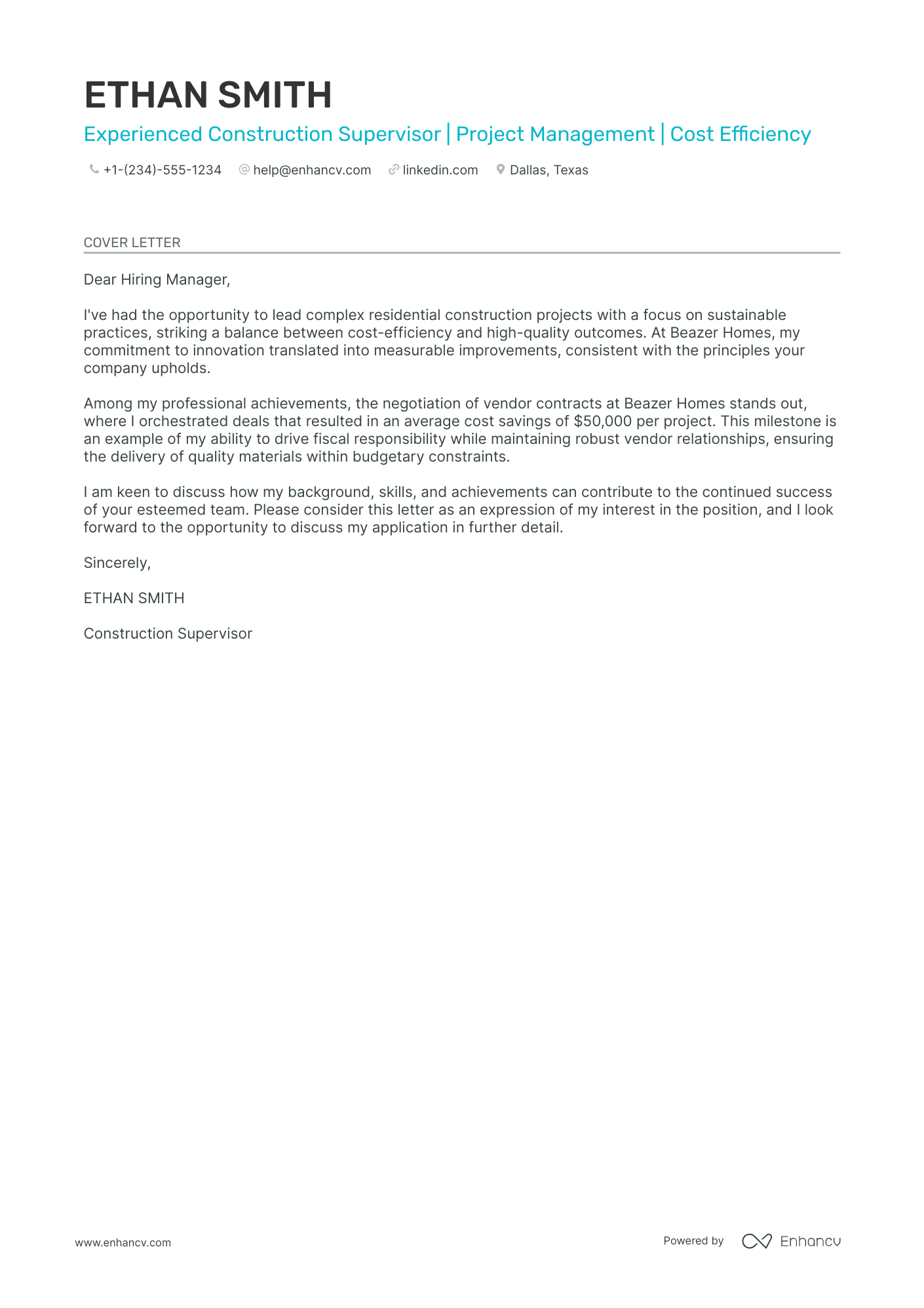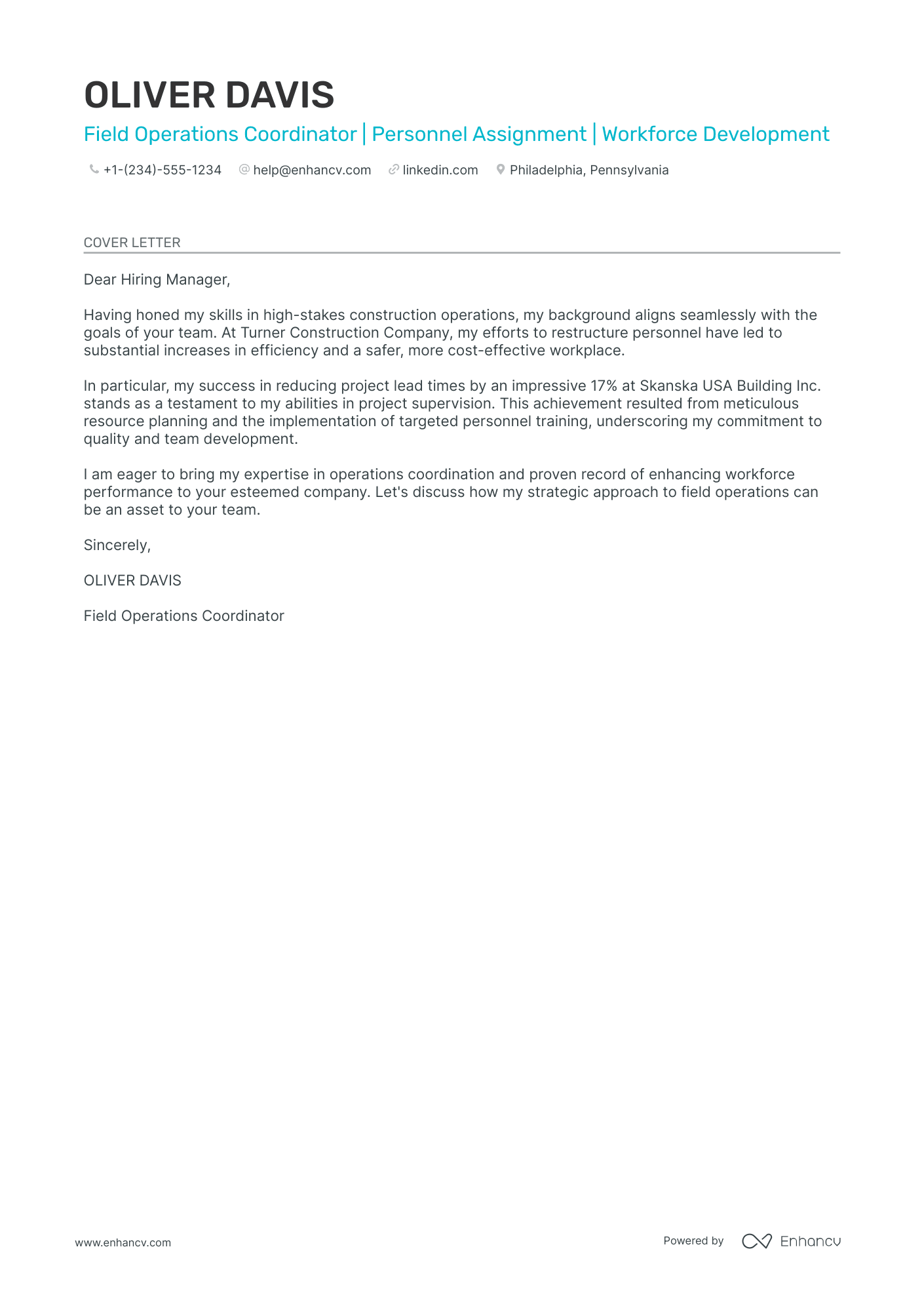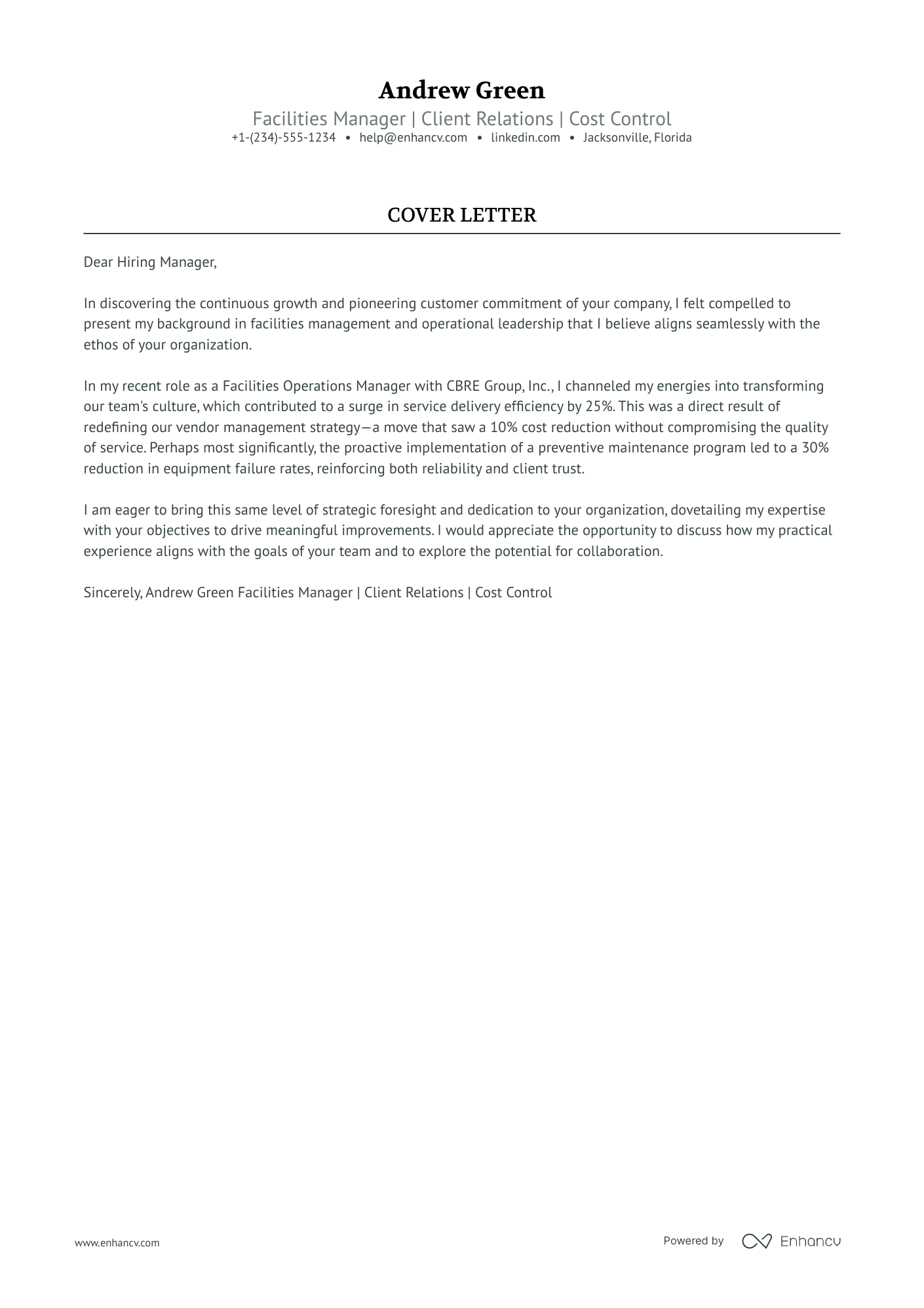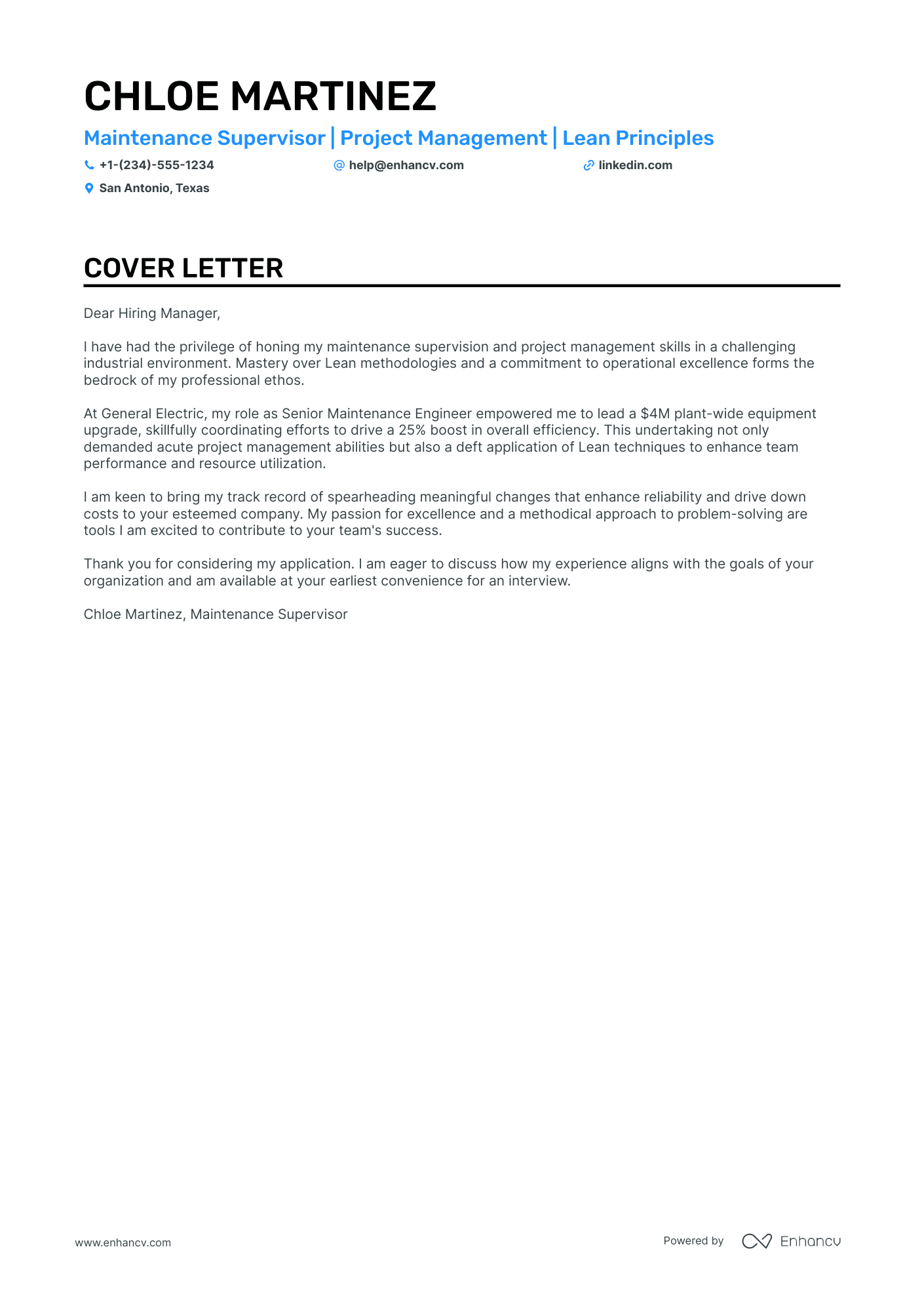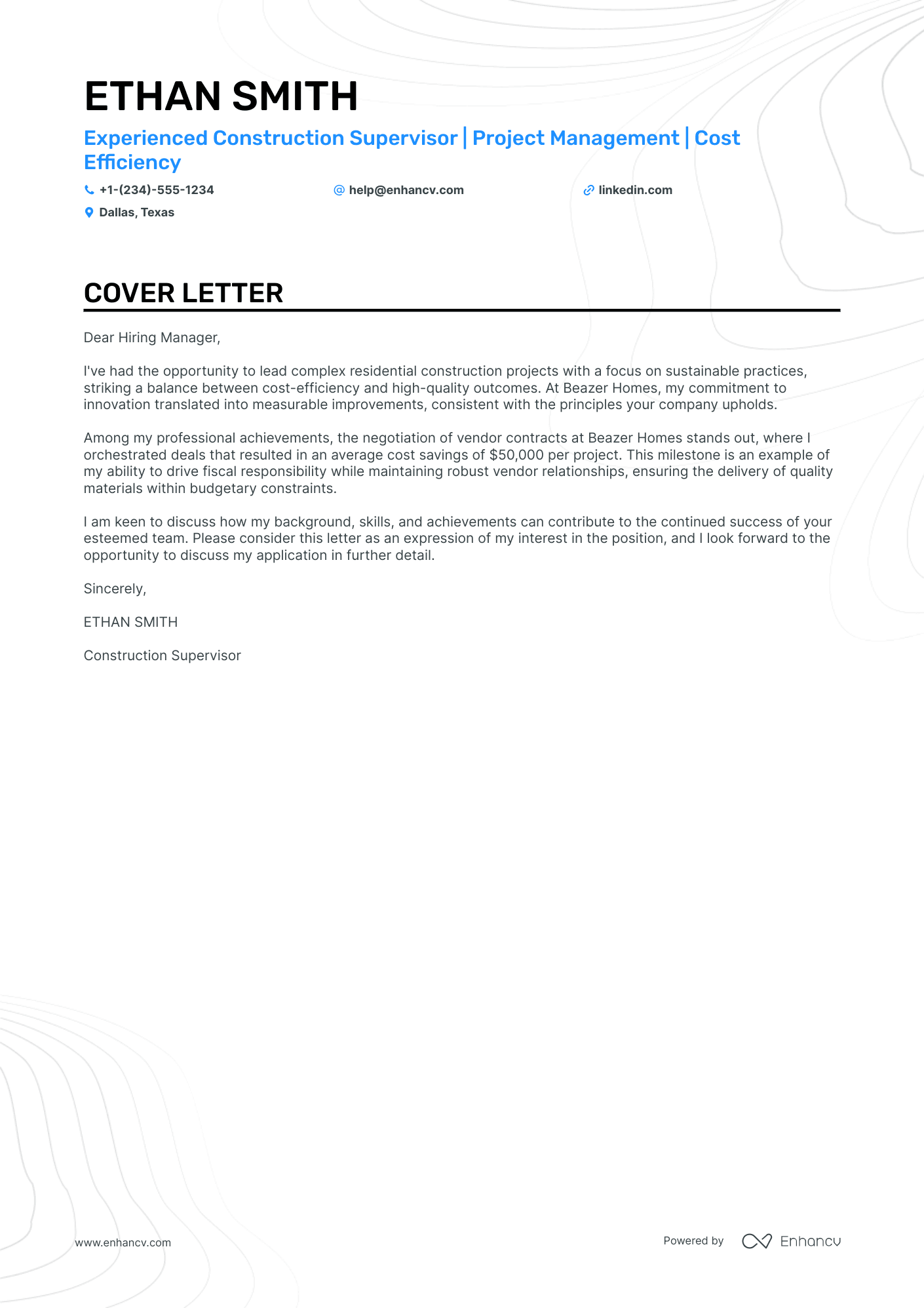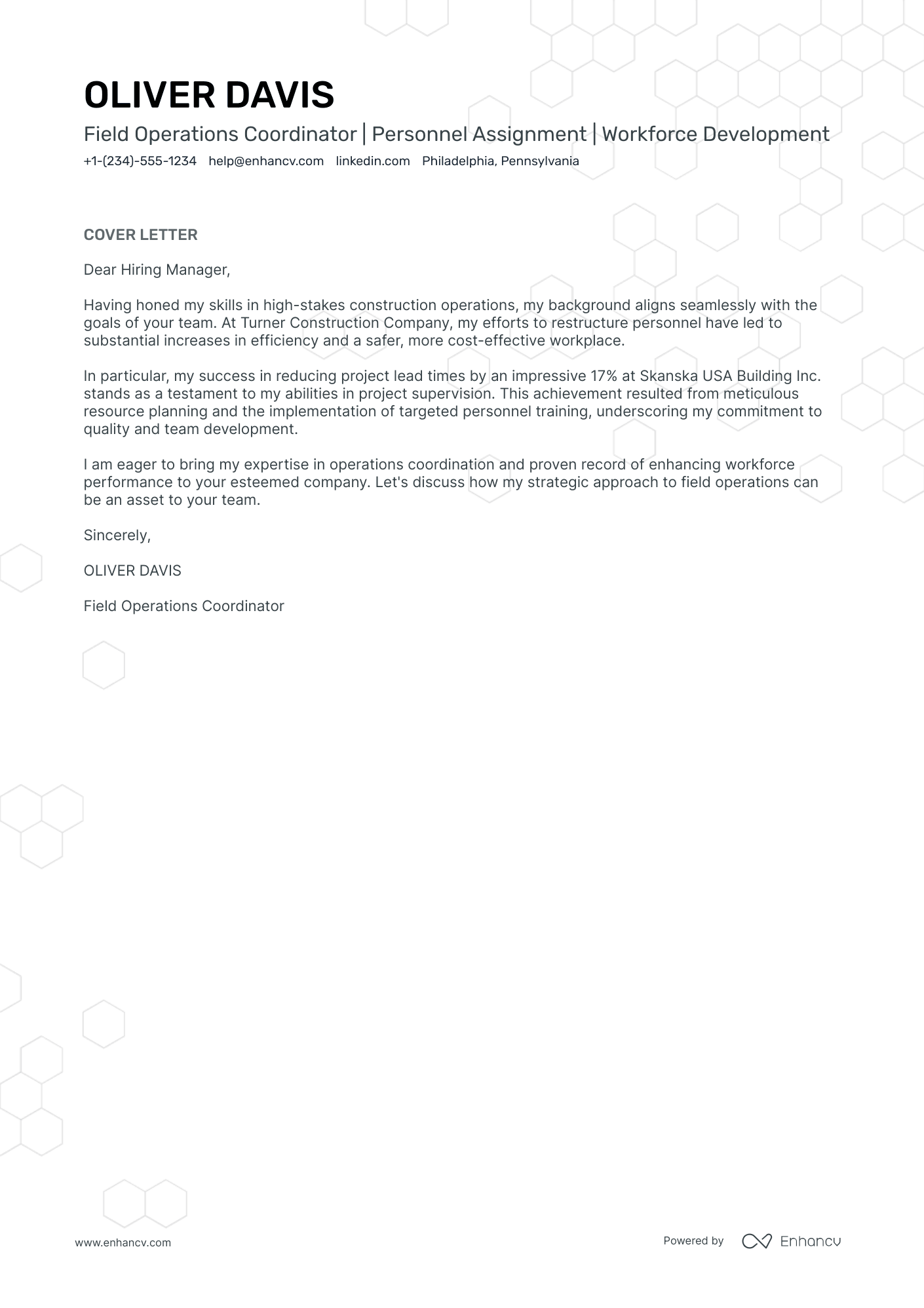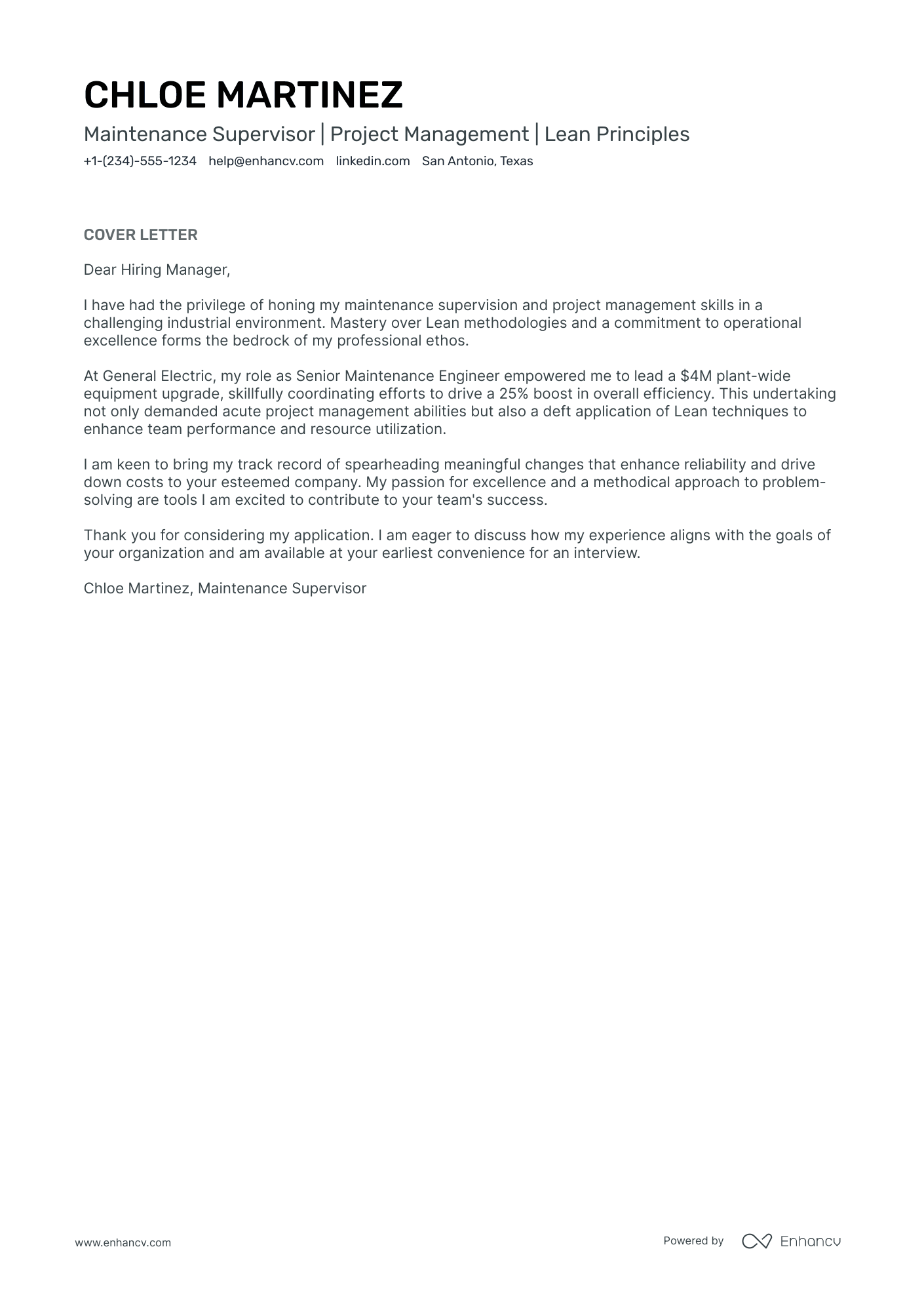Crafting an impressive construction project manager cover letter can be a daunting step in your job search. You've polished your resume and started applying, only to realize a compelling cover letter is also required. This isn't the space to rehash your resume; instead, focus on narrating the peak of your professional triumphs. Tackle formal tones and bypass clichés to maintain authenticity, all while keeping your story tight and impactful within one page. Let's begin your journey to standing out in the stack.
- Create a construction project manager cover letter to persuade the recruiters you're the best candidate for the role;
- Use industry-leading construction project manager cover letter templates and examples to save time;
- Dedicate your construction project manager cover letter space to your best achievement;
- Make sure your construction project manager cover letter meets recruiters' expectations and standards.
Avoid starting at the blank page for hours by using Enhancv's AI - just upload your resume and your construction project manager cover letter will be ready for you to (tweak and) submit for your dream job.
If the construction project manager isn't exactly the one you're looking for we have a plethora of cover letter examples for jobs like this one:
Drop your resume here or choose a file.
PDF & DOCX only. Max 2MB file size.
Construction project manager cover letter example
Elijah Brown
San Jose, California
+1-(234)-555-1234
help@enhancv.com
- Emphasizing past project management success — The cover letter showcases the candidate's achievement in leading a $10M commercial building project to completion ahead of schedule, directly relevant to the construction project manager role.
- Demonstrating cost-saving initiatives — It highlights the applicant's strategic negotiations that resulted in significant savings ($500K), which is crucial for a role that demands budget optimization.
- Illustrating leadership and team efficiency improvement — The letter reflects on the candidate's leadership qualities and the ability to increase team efficiency by 30%, both critical for effectively managing construction projects and teams.
What should your construction project manager cover letter look like - formatting and organizing your information
Have you ever wondered what are the must-have sections you need to include in your construction project manager cover letter? Our builder sets those up for you with:
- Header - dedicated to your contact information, the role you're applying for, and the date (don't forget to include your name);
- Greeting and opening paragraph - to create a personalized and memorable experience for recruiters;
- Body paragraph - emphasizing your skill set and knowledge that aligns with the role and helps you to stand out;
- Closing paragraph - leaving a great impression and ending with an optional signature.
Use a cover letter template to discover the best formatting for your construction project manager cover letter: that is single-spaced paragraphs and wrapping your content in a one-inch margin.
Ensure that both your resume and construction project manager cover letter are in the same font. Stand apart from the crowd by using modern, yet simple fonts, like Chivo and Rubik, instead of the overused Arial and Times New Roman.
Did you know that the Applicant Tracker System (or ATS) won't be assessing your construction project manager cover letter? Instead, submit your profile in PDF to recruiters to keep the same formatting and the design intact.
Skip the hassle of writing a cover letter. Use our free cover letter generator and get it done in moments.
The top sections on a construction project manager cover letter
- Header: Include your name, contact information, and the date, as this provides a professional look and makes it easy for the recruiter to reach out to you.
- Greeting: Address the cover letter to a specific person if possible, as it demonstrates that you have done your research and are genuinely interested in the company.
- Introduction: Briefly mention your experience in construction project management and express your enthusiasm for the opportunity, as this sets the tone for why you are the ideal candidate.
- Body: Detail your relevant experience, accomplishments, and specific skills in managing construction projects, including budget management, team leadership, and problem-solving, to illustrate your capability to handle the job's responsibilities.
- Closing: End with a strong closing statement, reaffirming your interest in the position and indicating your desire for a personal interview, while thanking the reader for considering your application.
Key qualities recruiters search for in a candidate’s cover letter
Proven track record of successful project delivery: Demonstrates reliability and the ability to bring projects to completion on time and within budget.
Strong leadership skills: Essential for delegating tasks, motivating team members, and maintaining the respect and attention of the workforce.
Excellent communication and interpersonal skills: Enables clear dialogue with architects, subcontractors, and clients, ensuring that everyone is aligned on project goals and expectations.
Risk management expertise: Shows the capability to anticipate and mitigate potential issues that may arise during the construction process.
Budgeting and cost control acumen: Indicates an understanding of financial aspects of construction projects and the ability to manage resources efficiently.
Knowledge of construction methods and technologies: Illustrates a solid understanding of the technical aspects involved in construction, essential for troubleshooting problems and ensuring quality workmanship.
Greeting recruiters with your construction project manager cover letter salutation
What better way to start your conversation with the hiring manager, than by greeting them?
Take the time to find out who the professional, recruiting for the role, is.
Search on LinkedIn, the company website. And for those still keen on making a fantastic first impression, you could even contact the organization, asking for the recruiter's name and more details about the job.
Address recruiters in the construction project manager greeting by either their first name or last name. (e.g. "Dear Anthony" or "Dear Ms. Smarts").
If you're unable to discover the recruiter's name - don't go for the impersonal "To whom it may concern", but instead use "Dear HR team".
List of salutations you can use
- Dear Hiring Manager,
- Dear [Project Manager's Name],
- Dear [Project Director's Name],
- Dear [Construction Supervisor],
- Dear [Company Name] Team,
- Dear [Mr./Ms. Last Name],
How to start your construction project manager cover letter introduction
The opening paragraph of your construction project manager cover letter can seem like a real enigma.
Where do you start writing?
In your construction project manager cover letter introduction, focus on yourself by stating what:
- gets you motivated and excited about the role;
- you like best about the company, from culture to awards.
Write no more than two sentences, which are both authentic and show your enthusiasm for the opportunity.
What to write in the body of your construction project manager cover letter
Now that you've got your intro covered, here comes the heart and soul of your construction project manager cover letter.
It's time to write the middle or body paragraphs. This is the space where you talk about your relevant talent in terms of hard skills (or technologies) and soft (or people and communication) skills.
Keep in mind that the cover letter has a different purpose from your construction project manager resume.
Yes, you still have to be able to show recruiters what makes your experience unique (and applicable) to the role.
But, instead of just listing skills, aim to tell a story of your one, greatest accomplishment.
Select your achievement that:
- covers job-crucial skills;
- can be measured with tangible metrics;
- shows you in the best light.
Use the next three to six paragraphs to detail what this success has taught you, and also to sell your profile.
Closing paragraph basics: choose between a promise and a call to action
You've done all the hard work - congratulations! You've almost reached the end of your construction project manager cover letter.
But how do you ensure recruiters, who have read your application this far, remember you?
Most construction project manager professionals end their cover letter with a promise - hinting at their potential and what they plan on achieving if they're hired.
Another option would be to include a call for follow-up, where you remind recruiters that you're very interested in the opportunity (and look forward to hearing from them, soon).
Choose to close your construction project manager cover letter in the way that best fits your personality.
Addressing limited to no experience in the construction project manager cover letter
There's nothing to worry about if you lack professional experience.
Your construction project manager cover letter could bridge the gaps in your professional history by focusing on what matters most to recruiters, that's either:
- skills - focusing on transferable ones you've gained, thanks to your life experience (e.g. volunteering, certificates, etc.);
- achievements - select the most relevant and noteworthy one from your history (e.g. education, projects, etc.);
- motivation - describe how you envision your professional growth in the next up to five years, thanks to this opportunity.
Key takeaways
Writing your construction project manager cover letter has never been easier, so remember to:
- Select a construction project manager cover letter template that automatically meets industry formatting (e.g. has one-inch margins, is single-spaced, is in PDF, etc.);
- Make your construction project manager cover letter personal by mentioning the recruiters' first or last name;
- Within the introduction, describe what you like best about the company in no more than two sentences;
- Use your construction project manager cover letter body to tell a story of your greatest achievement, backed up by job-relevant skills and technologies;
- If you have no professional experience, be honest about it in your construction project manager cover letter, but also write about your unique talents.
Construction Project Manager cover letter examples
By Experience
Senior Construction Project Manager
- Emphasizing relevant experience in the renewable energy sector showcases industry expertise and understanding, aligning with the company's focus on innovative projects.
- Quantifying achievements such as increasing team efficiency by 25% and implementing cost-saving measures totaling $500,000 annually highlights tangible contributions and impact, demonstrating value to potential employers.
- Highlighting leadership experience in managing a diverse team across various engineering disciplines underscores capability in handling complex, multidisciplinary projects.
- Expressing a committed interest in contributing to project timeliness and safety standards conveys dedication to key aspects of construction management, important for roles in the field.
By Role
